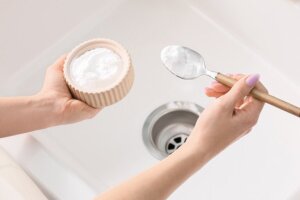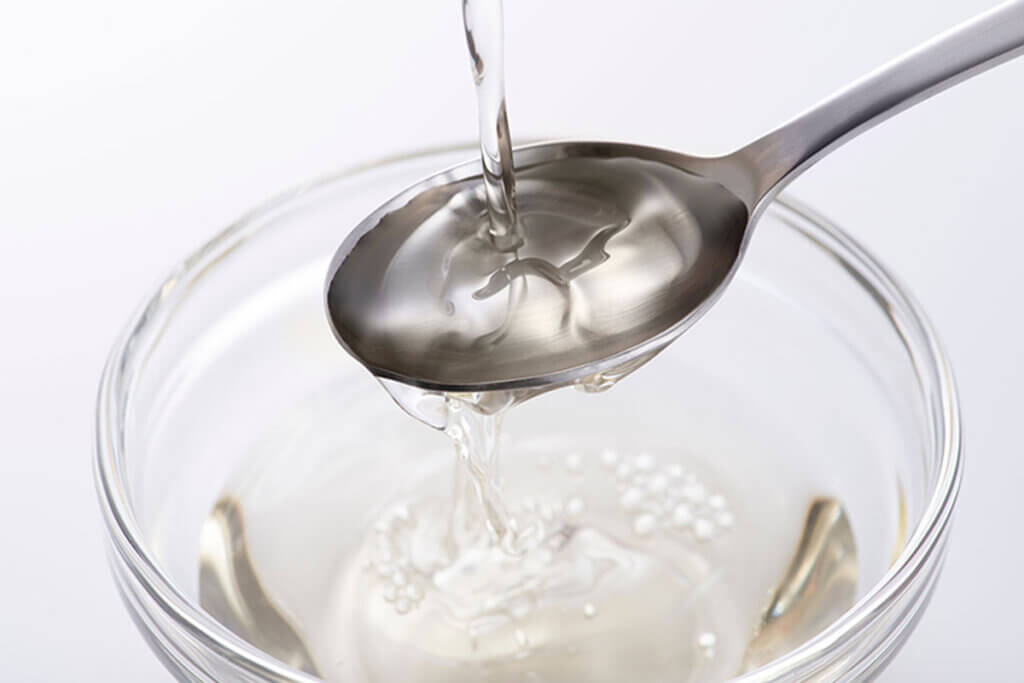Tricks for Cleaning the Sink Siphon and Avoiding Bad Odors

Today we’re going to share some useful tricks for cleaning the sink siphon in order to help you eliminate and combat bad odors. This usually happens because food, grease, and soap debris accumulate over time, affecting how the siphon operates and causing bad odors.
The best thing about our tricks is that they only require natural products that you probably already have at home. Interested to learn more? Keep reading!
It’s so easy to clean the sink siphon and say goodbye to bad odors
There’s nothing more uncomfortable than returning home to bad smells. Even worse if you arrive with a visitor! When this happens, we all make general checks for any rotting food in the kitchen or take out the garbage as quickly as possible. But what should you do if you find that the bad smell is coming from the sink?
Let us tell you that, even if you don’t have dirty dishes in the sink and you don’t see food remains at first glance, it doesn’t mean that the siphon is completely clean. As it is, it’s very likely that unpleasant aromas are coming from the siphon.
To put an end to this, we’ve listed some tricks to help you clean this pipe and prevent it from getting worse. Take note!
1. Cleaning the sink siphon: use lemon juice with coarse salt

One of the most successful home tricks when it comes to cleaning the sink siphon and preventing or combating bad odors is to take a lemon from your fridge and a little coarse salt from the cupboard. Here are the step-by-step instructions:
- Prepare half a cup of coarse salt and a cup of lemon juice.
- Pour the salt through the siphon, followed by the juice.
- Let the preparation sit for about 15 to 20 minutes. You’ll notice that it generates a chemical reaction inside the pipe.
- During the reaction time, bring a liter of water to a boil.
- Then, pour it down the drain to remove the remains of the product. This will also remove the grime.
- Repeat this task two or three times a week to ensure that your sink siphon is always clean.
2. Baking soda and white vinegar
Baking soda and white vinegar are two natural products that are the stars of cleaning. They have antibacterial and deodorizing properties and we’re going to take advantage of them! Here are the step-by-step instructions:
- Prepare one cup of baking soda and two cups of white vinegar.
- Pour all the bicarbonate into the siphon and then add the white vinegar. You’ll see how it generates a foam due to the chemical reaction.
- Prevent that foam from coming out by placing the siphon stopper or using a pot or something that obstructs the outlet.
- Wait around 15 minutes, while you put a liter of water to boil.
- Uncap the siphon and pour the hot water into the sink spout.
- Done! You now have a clean and deodorized siphon.
Cleaning the sink siphon: try table salt and white vinegar
Vinegar is once again the protagonist in this trick for cleaning your sink siphon. Except for this time, we’re using it alongside table salt. To clean the sink siphon and eliminate the bad smell from the pipes, you should use these two products as follows:
- Bring a liter of water to a boil and keep it on hand.
- Take a whole pot of table salt and pour it into the siphon.
- Then add the hot water followed by half a liter of white vinegar.
- Cover the siphon with its stopper or any other object that fulfills the task of not letting the foam escape.
- After 30 minutes, uncover and add another two liters of hot water to finish cleaning.

What to do if none of these tricks work?
If after cleaning your sink siphon with some or all of these tricks it still smells bad, you’ll need to take a more proactive stance. We recommend calling a plumber to identify the problem. In some cases, the pipe may be completely clean, but it might not be properly installed. This is the potential reason why the foul odor remains.
If this is your case, then your siphon may need to undergo some minor plumbing repairs or you may have to replace certain parts. The same applies if your pipework is in poor condition or if it’s old. Pipework can deteriorate over time and may start to malfunction.
Today we’re going to share some useful tricks for cleaning the sink siphon in order to help you eliminate and combat bad odors. This usually happens because food, grease, and soap debris accumulate over time, affecting how the siphon operates and causing bad odors.
The best thing about our tricks is that they only require natural products that you probably already have at home. Interested to learn more? Keep reading!
It’s so easy to clean the sink siphon and say goodbye to bad odors
There’s nothing more uncomfortable than returning home to bad smells. Even worse if you arrive with a visitor! When this happens, we all make general checks for any rotting food in the kitchen or take out the garbage as quickly as possible. But what should you do if you find that the bad smell is coming from the sink?
Let us tell you that, even if you don’t have dirty dishes in the sink and you don’t see food remains at first glance, it doesn’t mean that the siphon is completely clean. As it is, it’s very likely that unpleasant aromas are coming from the siphon.
To put an end to this, we’ve listed some tricks to help you clean this pipe and prevent it from getting worse. Take note!
1. Cleaning the sink siphon: use lemon juice with coarse salt

One of the most successful home tricks when it comes to cleaning the sink siphon and preventing or combating bad odors is to take a lemon from your fridge and a little coarse salt from the cupboard. Here are the step-by-step instructions:
- Prepare half a cup of coarse salt and a cup of lemon juice.
- Pour the salt through the siphon, followed by the juice.
- Let the preparation sit for about 15 to 20 minutes. You’ll notice that it generates a chemical reaction inside the pipe.
- During the reaction time, bring a liter of water to a boil.
- Then, pour it down the drain to remove the remains of the product. This will also remove the grime.
- Repeat this task two or three times a week to ensure that your sink siphon is always clean.
2. Baking soda and white vinegar
Baking soda and white vinegar are two natural products that are the stars of cleaning. They have antibacterial and deodorizing properties and we’re going to take advantage of them! Here are the step-by-step instructions:
- Prepare one cup of baking soda and two cups of white vinegar.
- Pour all the bicarbonate into the siphon and then add the white vinegar. You’ll see how it generates a foam due to the chemical reaction.
- Prevent that foam from coming out by placing the siphon stopper or using a pot or something that obstructs the outlet.
- Wait around 15 minutes, while you put a liter of water to boil.
- Uncap the siphon and pour the hot water into the sink spout.
- Done! You now have a clean and deodorized siphon.
Cleaning the sink siphon: try table salt and white vinegar
Vinegar is once again the protagonist in this trick for cleaning your sink siphon. Except for this time, we’re using it alongside table salt. To clean the sink siphon and eliminate the bad smell from the pipes, you should use these two products as follows:
- Bring a liter of water to a boil and keep it on hand.
- Take a whole pot of table salt and pour it into the siphon.
- Then add the hot water followed by half a liter of white vinegar.
- Cover the siphon with its stopper or any other object that fulfills the task of not letting the foam escape.
- After 30 minutes, uncover and add another two liters of hot water to finish cleaning.

What to do if none of these tricks work?
If after cleaning your sink siphon with some or all of these tricks it still smells bad, you’ll need to take a more proactive stance. We recommend calling a plumber to identify the problem. In some cases, the pipe may be completely clean, but it might not be properly installed. This is the potential reason why the foul odor remains.
If this is your case, then your siphon may need to undergo some minor plumbing repairs or you may have to replace certain parts. The same applies if your pipework is in poor condition or if it’s old. Pipework can deteriorate over time and may start to malfunction.







